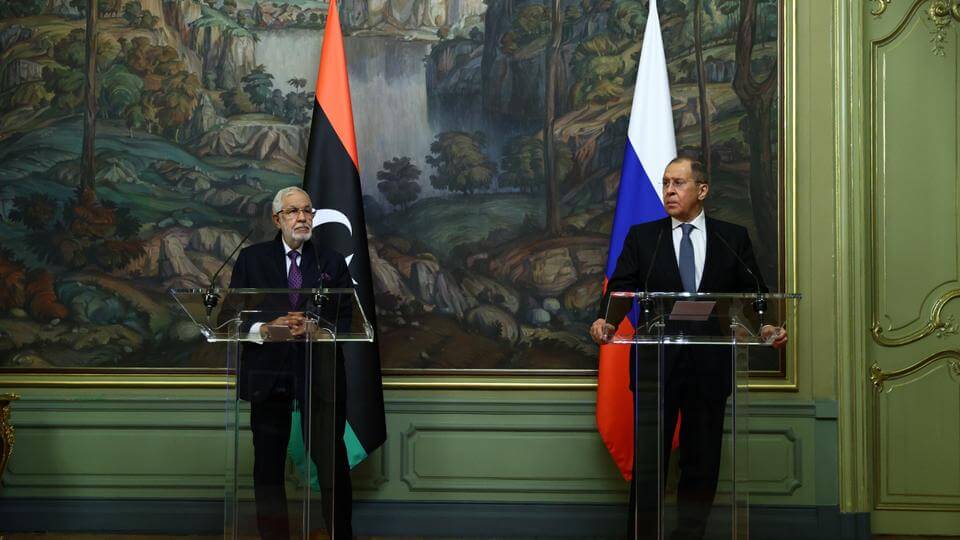During a press conference in Moscow on Wednesday, Libyan Foreign Minister Mohamed Taha Siala asked his Russian counterpart, Sergey Lavrov, for help in evacuating foreign fighters from Libya. The visit by the Libyan official to Russia was courtesy of an official invitation from the Russian Foreign Ministry to discuss the political and military developments in Libya.
The Libyan official stated, “We asked for Moscow's assistance to evacuate foreign fighters from Libya. We expressed our concern over seizing oil export revenues in a bank account that Libyans cannot benefit from.” He further added, “The Government of National Accord (GNA) has handed over the required budget to the Electoral Commission to hold the upcoming elections on Libya's Independence Day (24 December) in 2021.”
Stressing on Libya’s security and stability, he remarked, “We hope that no party will attempt to inflame the war again in Libya.” He further added: “I invite the parties who believe that the solution to the Libyan crisis has to be military to reconsider their stances, support the implementation of the peaceful solution and help to end the presence of foreign fighters.”
Sergey Lavrov also expressed his position that the Russia-backed Libyan National Army (LNA), led by General Khalifa Haftar, and internationally-recognised Government of National Accord (GNA) must now come together to find a common solution, saying, “Now we should strongly encourage the two sides to enter into dialogue, and to counteract attempts of the aggressive rhetoric, and especially of the threats of restarting military action.”
The oil-rich country has been in chaos since the Arab Spring protests and NATO bombing campaign that toppled dictator Muammar Gaddafi in 2011. Since then, several attempts have been made to build a democratic state by mainly two rival groups: the GNA, based in western Libya, and the LNA, based in eastern Libya. The tensions between the two resulted in a civil war in 2014.
Russia has had a multifaceted role in the Libyan war. First, in 2016, Moscow hosted the commander of the Tobruk-based LNA, Khalifa Haftar, on a diplomatic visit. In 2018, rumours surfaced of Russian intelligence providing money, arms, and training to Haftar’s forces. Additionally, in April 2019, the Kremlin-aligned Wagner Group, a Russian paramilitary organisation, deployed between 1,400 to 2,000 private military contractors (PMCs) to support Haftar’s attack on the Libyan capital Tripoli. Russia hoped that the legitimisation of LNA’s control over eastern and southern Libya would ensure that Moscow gained preferential access to oil reserves held by Haftar’s forces and revive Gaddafi-era basing agreements on Libya’s Mediterranean coast. However it also maintains a backchannel relationship with the UN recognised GNA, and this invitation is proof of that diplomatic relationship.
Referring to last week’s Egyptian delegation visit to Libya, Siala asserted, “The visit of the Egyptian delegation came very late. We would have preferred that the Egyptian side was present alongside all the other parties to contribute to building confidence between them.”
Last week Libyan Libyan Interior Minister Fathi Bashagha discussed “common security challenges and ways to enhance security cooperation” with the head of the Egyptian committee, Ayman Badie, in Tripoli. Like Russia, Egypt has supported Haftar’s LNA, believing that only Haftar can control extremism in Libya.
However, the latest meetings of both Russian and Egyptian officials with Libyan government authorities signal that they are now considering alternative options to secure their vested interests in the country by cooperating with the UN-recognised GNA.
Libyan Foreign Minister Seeks Russia’s Help to ‘Evacuate Foreign Fighters’
Libyan Foreign Minister Mohamed Taha Siala organised talks in Moscow on Wednesday and requested Russia to help evacuate foreign fighters from the war-torn country.
January 2, 2021

Libya's Foreign Minister Mohamed Taher Siala (L), and Russia's Foreign Minister Sergi Lavrov (R) SOURCE: REUTERS
